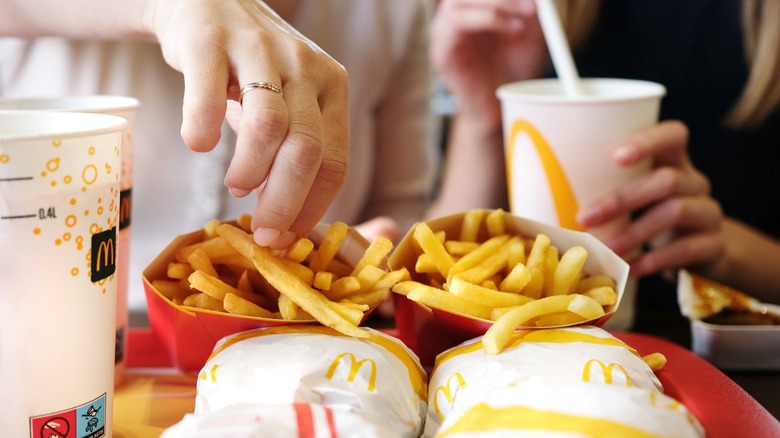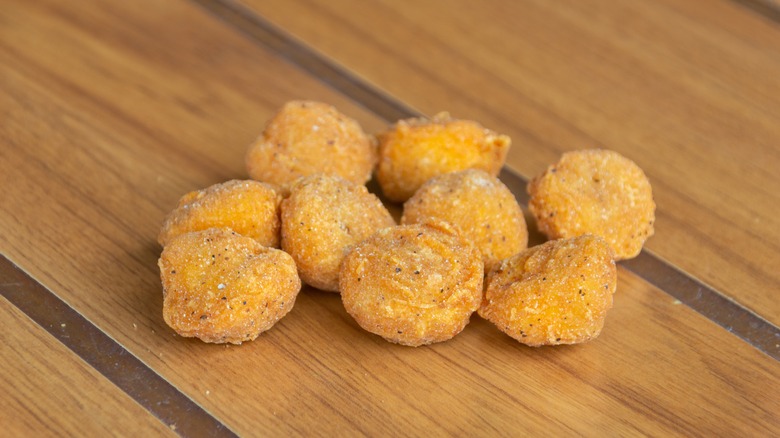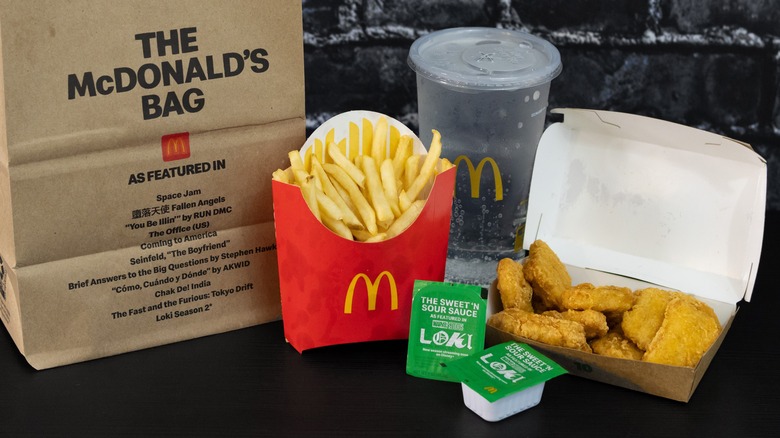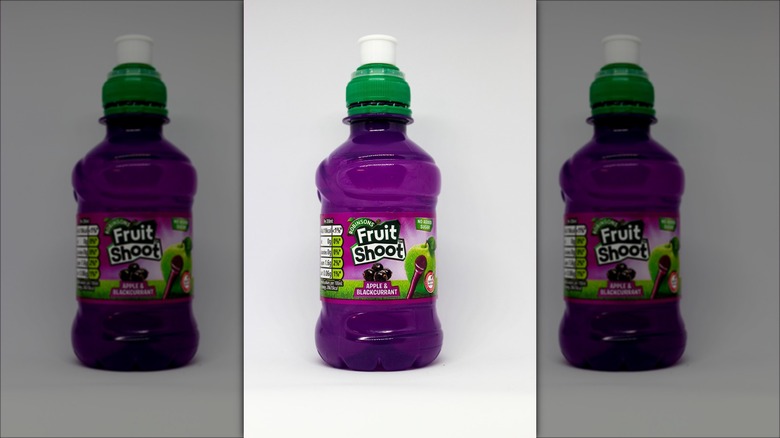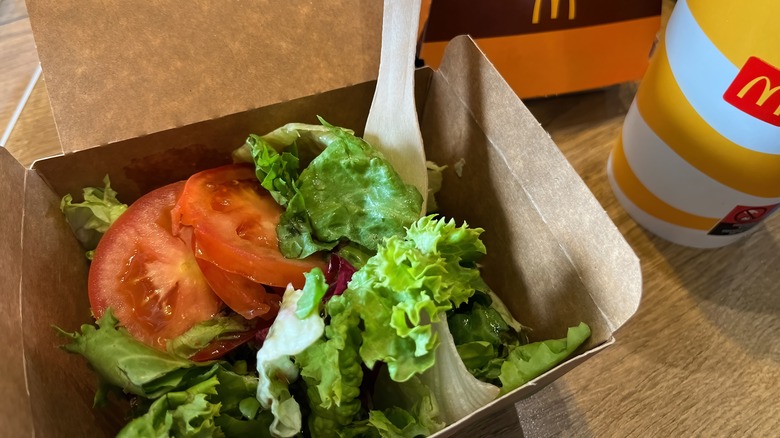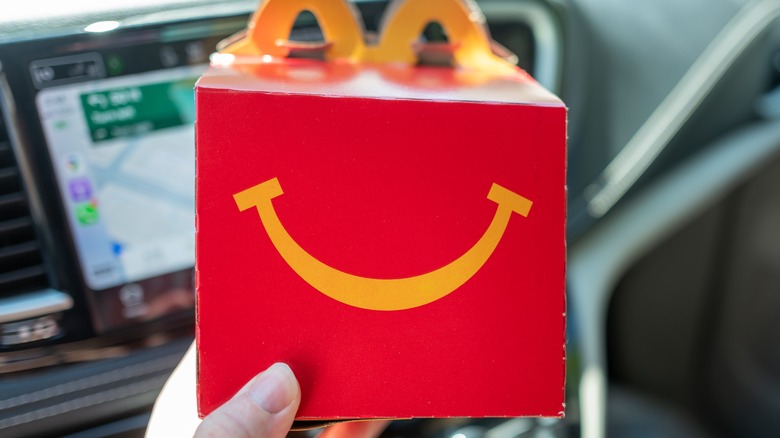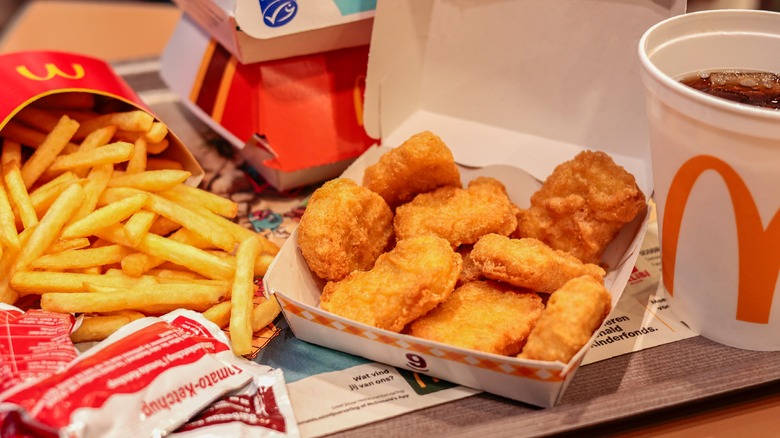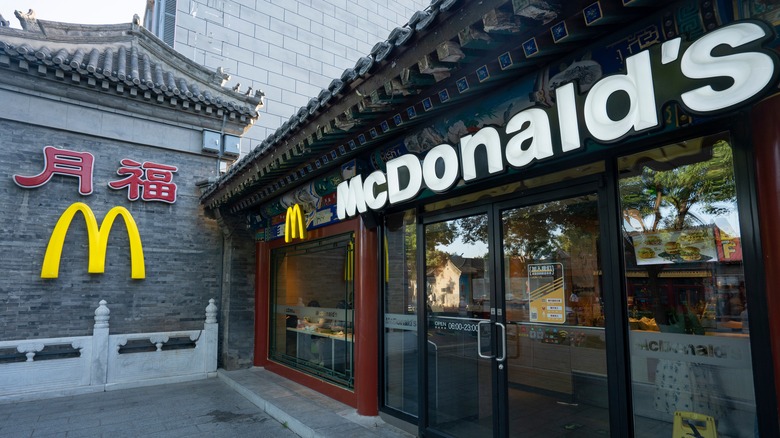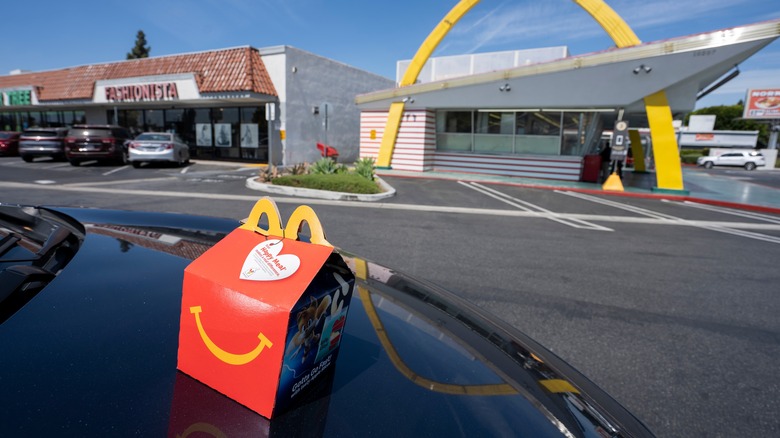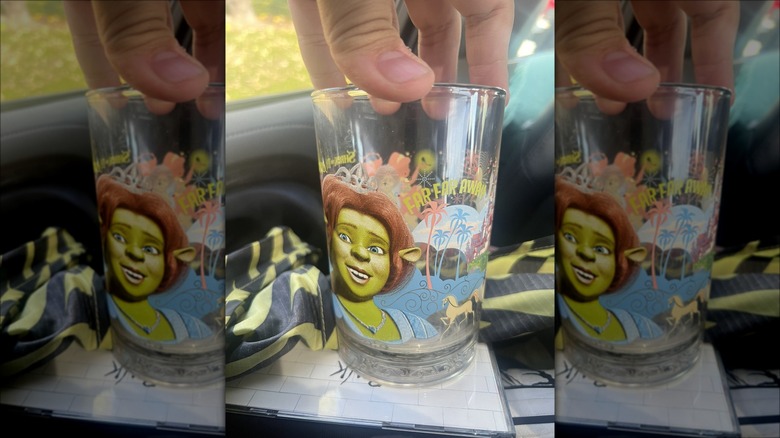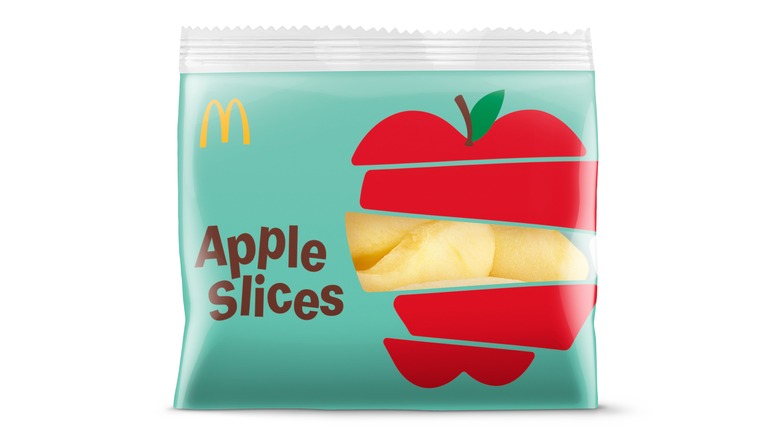The Biggest Recalls In McDonald's History
McDonald's may be the world's most valuable fast food chain, but even the Golden Arches aren't immune to the odd controversy. Over the years, the iconic burger joint has been criticized for everything from its impact on public health to the questionable ethics of advertising foods high in fat, salt, and sugar to children through the likes of Ronald McDonald and pals.
But some of McDonald's controversies carry far more weight than debating the health value of a Happy Meal. Like the majority of fast food chains, McDonald's has had to launch its fair share of recalls. While no brand is keen to take the blow to its finances or reputation, McDonald's has still pulled chicken nuggets, sauces, and even Happy Meal toys from thousands of restaurants over concerns about the risk they pose to the health and safety of customers. These are some of the biggest recalls to hit McDonald's over the years.
1. All Chicken McBites in New Zealand (2022)
The Golden Arches may be recognizable across the globe, but not every restaurant serves the same menu. Chicken McBites, a crunchy, savory side, can be found in countries such as Cyprus, Pakistan, and New Zealand. Though popular, they were axed from New Zealand's menu for a time after a production issue meant the chicken did not cook properly in restaurants.
The issue was discovered after a customer in Timaru complained about the raw state of his meat. "Hey McDonald's Timaru didn't realise I had to cook my own chicken tonight almost walked off my plate," Keegan Mackway-Jones wrote on social media (via Stuff). The chain subsequently pulled the Chicken McBites from all restaurants in New Zealand, revealing that it was working with its supplier to clarify issues with their product size specification. This may seem pretty drastic, considering only one customer had complained. However, with raw chicken posing a significant risk of food poisoning from the likes of salmonella, better to be safe than sorry.
2. Sweet 'n Sour Sauce from 89 McDonald's restaurants (2021)
With the dawn of McDonald's Chicken Nuggets in 1983 came the introduction of dipping sauces. The initial lineup consisted of Honey, Hot Mustard, Barbecue, and Sweet 'N Sour, the latter of which has become a firm favorite with McDonald's customers and placed fourth in our dipping sauce flavor ranking.
In November 2021, though, the fan favorite was temporarily pulled from McDonald's stores in Ireland after the company realized one batch had used mustard during the production process. The issue was that it failed to mention this on the ingredients list, instead simply listing the sauce's standard Irish ingredients of glucose-fructose syrup, water, apricot puree, spirit vinegar, and soy sauce.
This error affected tubs with a best-before date of February 23, 2022. A statement from the Food Safety Authority of Ireland stressed that this undeclared mustard could potentially pose a health risk to some customers. "This may make the affected batch unsafe for consumers who are allergic to or intolerant of mustard," it said. "Point-of-sale recall notices will be displayed in all McDonald's restaurants."
3. Bottles of Robinson's Fruit Shoots (2019)
Robinsons Fruit Shoots are a staple childhood drink in the U.K., and just as much of a staple at McDonald's up and down the country. Flavored with apple and blackcurrant, it's one of the four choices available with the chain's U.K. Happy Meals — which is why it once sparked a scare that it could pose a safety risk to young customers in 2019.
According to the U.K.'s Food Standards Agency (FSA), a fault was discovered with the spout on 200-milliliter bottles which meant that they could detach. This possible choking hazard was identified after multiple complaints, triggering a recall that affected Costco and Tesco as well as McDonald's.
Customers who'd already purchased the bottles were encouraged to return them for a refund. McDonald's issued its own cautionary statement, claiming it was "aware of packaging fault affecting the white drinking spout on a very small number of Fruit Shoot bottles" and that it had "decided to remove it from our premises and are currently awaiting new stock" (via Metro). With the affected bottles sold at McDonald's between June 22 and 28 and the recall going out on July 1, the majority of drinks purchased at McDonald's had probably already been long finished by customers. Regardless, it was still a necessary move to warn customers who may have been affected, just in case.
4. Salads from 3,000 McDonald's restaurants (2018)
Food poisoning outbreaks typically inspire some of the most frantic product recalls. In July 2018, it was McDonald's salads that sparked a panic after over 500 people contracted cyclosporiasis — a gastrointestinal illness caused by the parasite cyclospora — and suffered from its typical effects of intense diarrhea, nausea, stomach pain, and vomiting. Of those affected, 24 were hospitalized.
It was the Illinois and Iowa Health Departments that first identified McDonald's salads containing romaine lettuce and carrots as the most likely culprit. Not long after, McDonald's stopped selling salads at 3,000 restaurants in 14 states across the Midwest. This proved to be more than a temporary pause in salad service. McDonald's ultimately ditched the supplier that provided said salads, Fresh Express, to find a replacement. "The health and safety of our customers and the people who work in McDonald's restaurants is always our top priority," it stressed in a statement (via The Independent). "We proactively decided to remove our lettuce blend in impacted restaurants and replace it through a different supplier."
In the following years, McDonald's salads managed to glide by backlash-free. Of course, it helps that nobody seems to have been eating them. In 2020, McDonald's totally axed salads from its national menu due to a lack of demand. It seems like this had more to do with financial reasons than anything else, but removing salads also lowered the chain's risk of a repeat incident.
5. 32.6 million Happy Meal fitness trackers (2016)
McDonald's catches a lot of heat for the role it plays (or rather, doesn't play) in public health. For just as long, the chain has tried to counter these critiques with efforts such as introducing healthier options — which, as we now know, proved pretty futile — and boosting the visibility of its nutritional information. Some efforts have been even more creative, such as including mini plastic fitness bands as the free toy in Happy Meals.
Over 32 million of these fitness bands (known as "Step-It" bands) had been sold in the U.S. and Canada when McDonald's started receiving some concerning reports. While they were designed to encourage children to walk more and stay active, the bands were instead found to be irritating, even burning the skin of their wearers. After more than 70 complaints, McDonald's recalled all the bands, and the Consumer Product Safety Commission (CPSC) warned customers to take the wristbands away from children ASAP.
Anyone with a band at home was encouraged to return it to their local McDonald's where they would be offered a replacement toy and yogurt tube or apple slices. "Nothing is more important to us than the safety and well-being of our customers which is why upon learning about concerns with these bands we acted swiftly to stop distribution of these products," stressed McDonald's spokesperson Terri Hickey in a press release (via CNN). "We apologize to our customers who were impacted and for the inconvenience this recall has caused."
6. 1 million McDonald's Chicken McNuggets (2015)
There's a lot of misinformation out there about what goes into your chicken nuggets — especially those from McDonald's. As lifelong nugget loyalists, we'd like to take this opportunity to clear a few things up. While they may have been specifically engineered to be as addictive as possible, no, McDonald's Chicken McNuggets don't contain any pink slime, despite what that viral social media post your grandmother saw would have you believe. They may be packed with fillers and additives, but they also contain real, white-meat chicken, plus a decent-ish dose of protein.
But one thing they shouldn't contain is plastic. That's why McDonald's recalled nearly 1 million McNuggets from a Thai factory in 2015. A customer in Japan had previously found tiny plastic fragments in their meal, and during the recall, another customer was served up McNuggets containing a flavorful piece of vinyl. The restaurant issued a statement apologizing to its customers, promising that it was "taking quick measures to analyze the cause of the contamination" (via Mother Jones).
After the factory concluded its own multi-step investigation, it insisted that the plastic definitely did not stem from any of its facilities. That was the final word on the matter, and it was never fully established where or how the plastic made its way into the nugget. It remains a real-life McMystery to this day.
7. Chicken and beef in multiple cities in China, Hong Kong, and Japan (2014)
What is McDonald's without its hamburgers? The chain was forced to confront this exact question in 2014 when a scandal led to the temporary recall of all chicken and beef (which makes up the vast majority of the McDonald's menu) from locations in select cities.
The issue all came down to a supplier (rather than McDonald's itself). Multiple McDonald's locations in cities across China were stripped of meat after a video emerged exposing the inner workings of Shanghai Husi Food, a food-processing plant used by McDonald's. This included handling food with bare hands and picking up meat from the floor to place it directly back onto the processing line. After an investigation by the Shanghai Municipal Food and Drug Administration, it was found that the facility had also repackaged expired beef and chicken products.
McDonald's wasn't the only company supplied by Shanghai Husi Food in China. Burger King, Starbucks, KFC, and more also received products from the factory. However, it feels like the Golden Arches faced the brunt of the bad headlines after beef and chicken products were pulled from most McDonald's in northern and central China, chicken was axed from its Hong Kong restaurants (in addition to some veggie products and iced tea), and nearly 500 stores in Japan stopped selling nuggets. Sales subsequently plummeted in the region, with a 7.3% drop recorded in APMEA (Asia Pacific, Middle East, and Africa) in July 2014 alone.
8. 2.4 million Happy Meal whistles (2014)
They may be quite literally designed to evoke joy, but some Happy Meal toys have proven problematic for McDonald's. Kids are unpredictable with toys, which is why anything marketed to children needs to be up to scratch in all areas of health and safety.
In 2014, it was Hello Kitty whistles that were recalled en masse over a perceived choking hazard. The whistles were released as part of a 40th-anniversary collection for the character (who, contrary to popular belief, is not actually a cat). The a 3-inch-tall Hello Kitty clutching a birthday lollipop was found to contain detachable pieces that posed a safety issue for any young child tearing into their free toy.
The U.S. Consumer Product Safety Commission (CPSC) was alerted by reports of two children inhaling and coughing out this detachable piece. One of the children subsequently needed medical attention. The CPSC — which exists purely to protect consumers from potential product-induced injury — quickly issued a recall notice for 2.3 million products in the U.S. and 200,000 in Canada. McDonald's managed to recover approximately 1.6 million whistles, including those that never made it to stores or customers, and the company encouraged patrons to confiscate any whistles from their children and return them to a restaurant in exchange for another toy plus a yogurt tube or apple slices.
9. 13.4 million Happy Meal Shrek cups (2010)
Sometimes, the things we love most in life are capable of inflicting the most pain. Not to be dramatic, but that's kind of how we felt when McDonald's pulled back its collectible "Shrek Forever After" glasses in 2010. Launched to celebrate the release of the fourth film in the franchise, the glasses featured paintings of one of four characters (Shrek, Fiona, Puss in Boots, and Donkey).
Sadly, all four glasses were pulled from circulation after it was discovered that the Puss in Boots glass contained concerning levels of a toxic heavy metal known as cadmium. While the amount of cadmium wasn't particularly high, the biggest concern was that long-term exposure caused by drinking from the glasses could damage the liver, kidneys, lungs, nervous system, or brain. There were also worries that young children could unknowingly consume cadmium by holding the glasses then putting their unwashed hands in their mouth, with federal regulators finding that it only took eight touches to expose a 6-year-old to hazardous levels.
The U.S. Consumer Product Safety Commission (CPSC) warned anyone who'd bought one of the $2 glasses to stop using them. About 9 million had already been sold by the time of the recall, with 3 million more awaiting sale. Fortunately, there were no reports of any illness — although some fans remain oddly enthusiastic about collecting and using the cadmium-ridden glasses to this day.
10. Thousands of packets of apple slices (2010)
McDonald's long and laborious fight against its reputation as a perpetrator of bad health habits was dialed up a notch in 2004 when it added bags of apple slices to the menu. Years later, it made apple slices a default side for Happy Meals, which made McDonald's the seller of 10% of all sliced apples in the country, and contributed to the tripling of apple consumption in the U.S. The chain's grip on the nation's apple interests made its 2012 recall all the more alarming. After production equipment tested positive for listeria, Missa Bay LLC — and its parent company, Ready Pac Foods Inc. — was forced to recall 293,488 cases and 296,224 individual packets of fruit, veggies, snacks, and sandwiches across the likes of Burger King, Wegmans, Wawa, and, of course, McDonald's.
Nobody fell ill, but apple slices with use-by dates of July 8 through August 20, 2012, were removed from stores, just to be safe. "In an abundance of caution, we stopped serving all existing apple products from Ready Pac's Missa Bay facility and removed them entirely from our restaurants and distribution centers," said a McDonald's spokesperson (via Patch). "This is a precautionary voluntary measure, only. It's important to note that McDonald's has not received any reports of illness with Ready Pac's recall." Similar to salmonella and E. coli, listeria can wreak havoc on the stomach, making this a lucky near-miss for the fast food restaurant.
